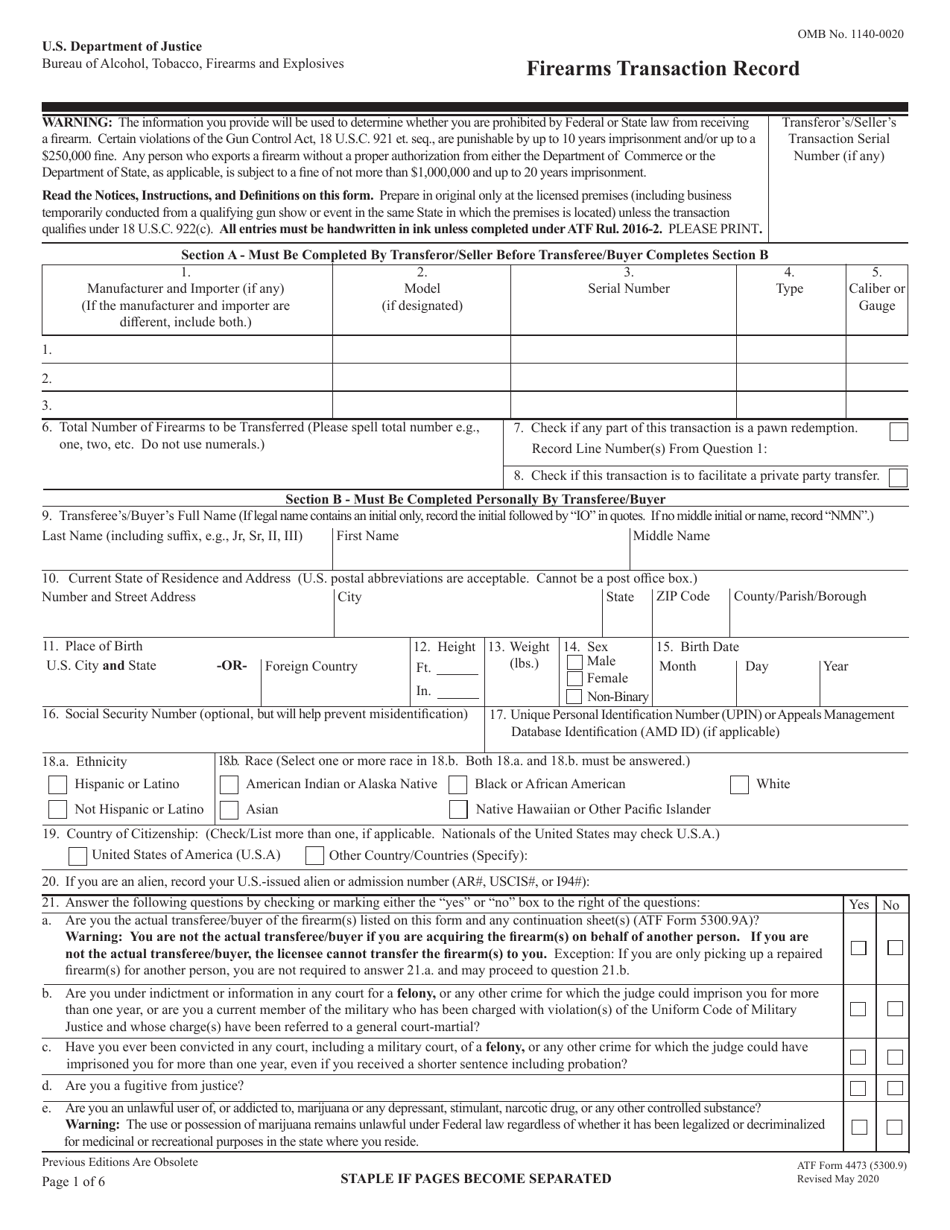If you’re in the market for a firearm, it’s crucial that you understand the laws and regulations surrounding their purchase and ownership. One of the most important documents you’ll encounter is the ATF Form 4473. This form, also known as the Firearms Transaction Record, is required by law for all licensed dealers to obtain before selling a firearm to a customer.
 The Purpose of ATF Form 4473
The Purpose of ATF Form 4473
So what exactly does the ATF Form 4473 entail, and why is it necessary? Put simply, the form collects personal information from the buyer to run a background check to ensure that they are legally allowed to own a firearm. The information collected on the form includes:
- Name
- Address
- Date and place of birth
- Height, weight, and gender
- Race and ethnicity
- Citizenship status
- Country of origin (if not a U.S. citizen)
- Social Security number or Alien number
- Contact information (phone, email, etc.)
- Firearm information (make, model, serial number, etc.)
- Information on previous convictions or restraining orders related to domestic violence
- Other personal information deemed necessary by ATF regulations
With all of this information, the dealer then submits the form to the ATF’s National Instant Criminal Background Check System (NICS) to see if there are any flags that might disqualify the buyer from owning a firearm. Some examples of disqualifiers include:
- Being convicted of a felony or domestic violence
- Being subject to a restraining order related to domestic violence
- Being addicted to drugs or alcohol
- Being a fugitive from justice
- Being an illegal immigrant or in the country on a nonimmigrant visa
- Being dishonorably discharged from the military
- Being judged mentally incompetente
If the background check comes back clear, the buyer is allowed to purchase the firearm.
 How to Fill Out ATF Form 4473
How to Fill Out ATF Form 4473
If you’re in the process of purchasing a firearm from a licensed dealer, you’ll need to fill out the ATF Form 4473. Here’s a step-by-step guide on how to fill it out:
- Enter the date of the transaction and the dealer’s name and address.
- Section A: Enter your personal information as it appears on your government-issued ID, such as your driver’s license or passport. If any of the information on the form differs from what is on your ID, the sale may be denied.
- Section B: Answer the citizenship question. If you are not a U.S. citizen, you will need to provide your alien number.
- Section C: Answer the questions on your criminal history. If you answer “yes” to any of the questions, provide additional information in the space provided.
- Section D: Provide your race and ethnicity. This question is optional and will not affect the outcome of the background check.
- Section E: Answer the questions about your mental health history. If you’ve ever been adjudicated as a mental defective, committed to a mental institution, or been the subject of involuntary commitment or competency proceedings, you’ll need to provide additional information in the space provided.
- Section F: This section is for the dealer’s use only.
- Section G: Review the certification statement and sign and date the form.
It’s important to take your time and fill out the form accurately to ensure that the background check process goes smoothly. If there are any mistakes or discrepancies on the form, the sale may be delayed or denied.
 FAQs About ATF Form 4473
FAQs About ATF Form 4473
Now that you understand the basic purpose and process of the ATF Form 4473, let’s dive into some commonly asked questions about the form and its use:
What types of firearms are covered by the ATF Form 4473?
Any firearm classified as a “firearm” under the Gun Control Act of 1968 is covered by the ATF Form 4473. This includes:
- Handguns
- Long guns, such as rifles and shotguns
- Antique firearms
- Homemade firearms
What types of firearms are not covered by the ATF Form 4473?
The ATF Form 4473 does not apply to firearms classified as “destructive devices” or “machine guns” under the National Firearms Act of 1934. These firearms are subject to additional regulations and require an additional form and tax stamp to purchase.
Is the ATF Form 4473 required for private sales or transfers?
No, the ATF Form 4473 is only required for sales or transfers made by licensed firearms dealers. Private sales and transfers between individuals are not subject to the same background check requirements and are governed by state laws.
How long is the ATF Form 4473 kept on file?
By law, licensed firearms dealers are required to keep the ATF Form 4473 on file for at least 20 years. This ensures that law enforcement can trace the history of any given firearm if necessary.
What happens if the background check comes back with a delay?
If the background check system returns a delay response from the FBI, the dealer must wait three business days before completing the sale. If the background check does not come back within 3 business days, the dealer may choose to proceed with the sale, but it is at their discretion. In some rare cases, a delay response may turn into a denial if further research is done and disqualifying information is found.
 Conclusion
Conclusion
The ATF Form 4473 is an essential document for anyone looking to purchase a firearm from a licensed dealer. It collects important personal information to ensure that the buyer is legally allowed to own a firearm and provides a crucial tool in preventing dangerous individuals from obtaining firearms. By taking the time to understand the purpose and process of this form, you’ll be better equipped to navigate the firearm purchasing process smoothly and responsibly.